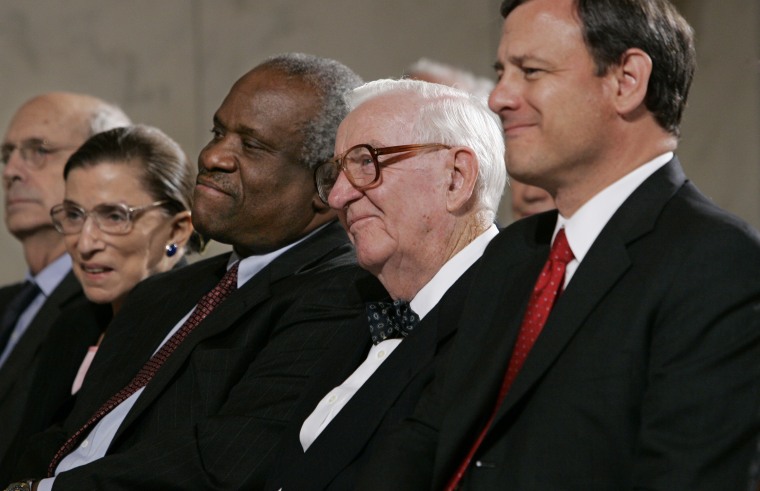Republicans are promising a "whale of a fight" during the congressional election campaign if President Barack Obama picks too liberal a nominee to succeed retiring Supreme Court Justice John Paul Stevens.
Eleven days before his 90th birthday, Stevens said Friday he would step down when the court finishes its work for the summer, in hopes that a replacement could be confirmed well before the next term begins in October.
Obama said he would quickly name a successor in the mold of Stevens, who he said was a voice for ordinary people rather than powerful interests.
A White House official said about 10 people are under consideration, but speculation has focused on fewer than that. Leading candidates are said to be Solicitor General Elena Kagan, 49, and federal appellate judges Merrick Garland, 57, in Washington and Diane Wood, 59, in Chicago. All three were considered last year as well, and Obama interviewed Kagan and Wood before choosing Sonia Sotomayor for the high court.
Of those, Wood would be most likely to excite Obama's liberal base and stir up conservative opposition. Garland is seen as most acceptable to Republicans, with Kagan somewhere in between.
Senate Republicans said the nominee should not be an activist, which they describe as someone driven by a preferred result rather than by the law. In practice, though, Republicans find that only liberal Democratic-appointed judges wear the activist label.
"I have hopes that President Obama will at least try to appoint somebody who will get a huge bipartisan vote, and if he will, he's going to go down in history as a better president," said Sen. Orrin Hatch, R-Utah. "If he doesn't, there's going to be a whale of a fight if he appoints an activist to the court. That's not good for him, it's not good for the Senate, it's not good for the country."
Looking toward the hearings, Senate Republican leader Mitch McConnell of Kentucky said, "Americans can expect Senate Republicans to make a sustained and vigorous case for judicial restraint and the fundamental importance of an evenhanded reading of the law."
'Civil discourse'
Much like the Republicans, Democrats said they hoped to avoid a partisan fight, though neither party appears to expect anything other than a rancorous debate. Sen. Patrick Leahy, D-Vt., chairman of the Senate Judiciary Committee, appealed for civility.
"I hope that senators on both sides of the aisle will make this process a thoughtful and civil discourse," he said.
With just 41 seats in the Senate — their second-smallest contingent in 29 years — Republicans would have to be unified to block an Obama nominee. Last year, nine Republicans joined to help confirm Obama's first high court nominee, the liberal-leaning Sotomayor.
Democrats said they would follow the same approach that led to Sotomayor's confirmation in August as the court's 111th justice. Obama nominated her less than four weeks after Justice David Souter announced his retirement. The Senate held a confirmation hearing in July.
Stevens is the court's last remaining World War II veteran. His retirement had been hinted at for months, and the White House had made clear it would be ready to nominate a replacement quickly.
Ready for battle
At the very least, the high court nomination could rev up both Democratic and Republican fundraising machines for the November election, even though Stevens' replacement by a liberal-leaning justice would not alter the court's ideological balance. Partisans on both sides were ready for a conflict.
Jay Sekulow, chief counsel at the conservative American Center for Law and Justice, said, "President Obama is likely to name a nominee who will embrace an extremely liberal judicial philosophy."
Michael Keegan, president of the liberal People for the American Way said, "In recent years, the court has given extraordinary preference to powerful interests at the expense of ordinary Americans. Justice Stevens was a bulwark against that trend. Our country's next justice must play a similar role."
How much of a fight Republicans put up probably will turn on whom Obama chooses.
"If it's Diane Wood, I think you'll see a very strong pitched battle," said Michael Carvin, a partner with the Jones, Day law firm who served in the Reagan administration Justice Department and is active in Republican politics.
Stevens' legacy
Beyond the political back-and-forth, a new justice is unlikely to exert the same influence for which Stevens has been known over the past 15 years. He has repeatedly demonstrated an ability to attract the support of the court's swing votes, now-retired Justice Sandra Day O'Connor and Justice Anthony Kennedy, to preserve abortion rights, to limit application of the death penalty and to restrain Bush administration policies on the detention of suspected terrorists following the Sept. 11, 2001, attacks.
However, after the arrival of Chief Justice John Roberts and Justice Samuel Alito, President George W. Bush's appointees, Stevens more often was among the four liberal justices in dissent. He was on the losing end of a major case involving campaign finance laws in January.
That dissent showed both the eloquence of Stevens' writing and, in his stumbling reading of his opinion in the courtroom, signs that his age might at long last be affecting him, though he remains an active tennis player and swimmer.
Roberts said in a written statement Friday that Stevens "has enriched the lives of everyone at the court through his intellect, independence, and warm grace."
